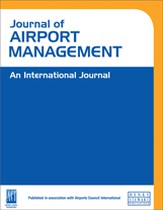Preventive wildlife strike strategy implemented at the airports operated by Fraport Greece during the COVID-19 pandemic
Abstract
Any collision between wildlife (including birds) with an aircraft is known as a wildlife strike. Most of the time such a strike has no operational impact but occasionally it could result in delays because of a technical check or even cause damage to aircraft. The COVID-19 pandemic severely affected Europe's transport sector. Air connectivity collapsed worldwide and the demand on the airports operated by Fraport Greece (FG) decreased significantly during the pandemic years (2020–21). With less air traffic and more stay-home orders, a variety of bird species were attracted to the green, quieter areas of the airports. The European Aviation Safety Agency (EASA) issued warnings concerning the increased presence of wildlife hazards in European airports. This case study aims to communicate to the aviation industry the wildlife strike prevention strategy implemented at the airports operated by FG during the pandemic years. The fundamentals of wildlife management, airport ecology, flight safety and sustainability are presented in a structured way to provide the reader with many relevant messages. The management implications, together with the best practices of this preventive wildlife strike strategy, are discussed for their possible wider use in the aviation industry.
The full article is available to subscribers to the journal.
Author's Biography
Dionysios Ntampakis is a highly motivated professional specialising in wildlife surveys, training, wildlife strike risk assessment, wildlife hazard management programmes and biodiversity conservation. Dionysios holds a Master of Science in Wildlife Management, Conservation and Control (University of Reading, UK) and a Master's in Aviation Management (TH Wildau, Berlin, Germany). He has more than 15 years' experience in conflict mediation between wildlife and aviation safety.
Dimitrios Monogios has more than 35 years of working experience in the airline, ground handling and airport industry, out of which 22 years has been in organisation and employee development (OED). He has expert ability to lead project teams and translate employee-required knowledge, skills and behaviours into high-impact learning designs, curricula and workshops to create an internal knowledge transfer. He has extensive teaching experience with more than 6,000 training hours in Management — Aviation Safety and Human Factors training. Dimitrios Monogios obtained his BSc in Statistic and Actuarial Sciences from the University of Piraeus, a Diploma in Quality System Management from the European Organization for Quality and a Master's in International Business Administration (IMBA) from Glasgow University.
Marianna Moira has worked for the Operations Division of Fraport Greece since 2017. She is responsible for assisting in planning and supervision of the daily wildlife hazard management procedures implemented by over 150 employees in 12 regional Greek airports. Some of her main tasks include training the airport operations staff on wildlife hazard management, analysing trends in wildlife activity and strikes and reporting results to senior management and the Civil Aviation Authority. Marianna graduated with a Distinction in her Master's degree on Agricultural Sciences and Engineering from the Agricultural University of Athens.
Athanasios Tsiratzidis is a conservation biologist with experience in biodiversity conservation and habitat management projects. He is a field research expert with a systemic overall approach for analysing ecological data. From May 2018, he has worked under the Operations Division at Fraport Greece, based at Thessaloniki Airport ‘Makedonia’. His main tasks include the local supervision of the wildlife control team, airport habitat and wildlife monitoring, implementation of wildlife control and habitat management measures to prevent wildlife strikes. He provides the training in pyrotechnics use for bird control and implements various biodiversity conservation initiatives.
